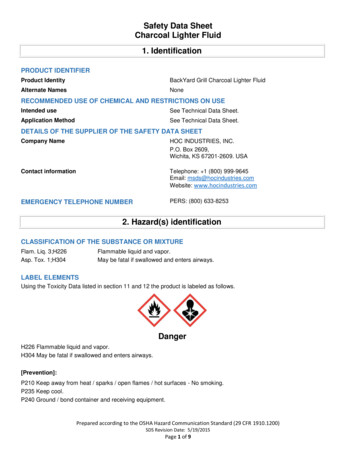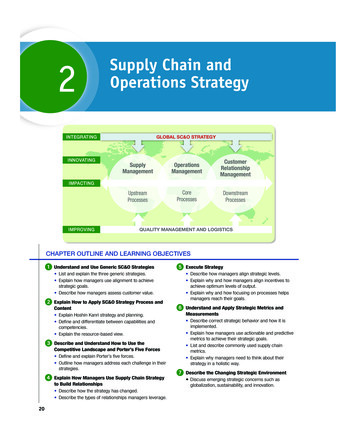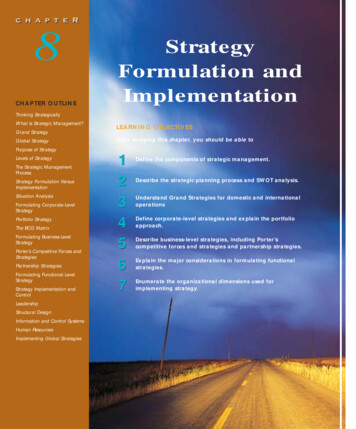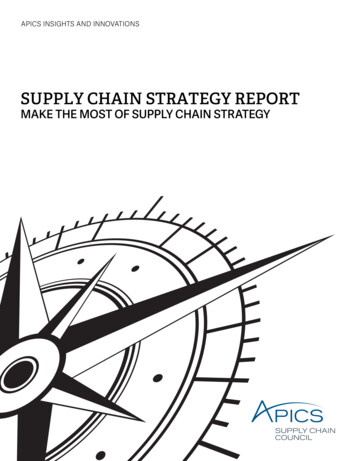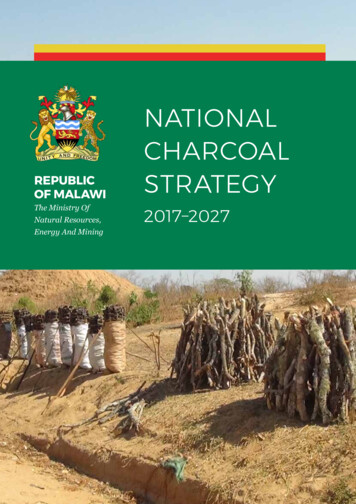
Transcription
REPUBLICOF MALAWIThe Ministry OfNatural Resources,Energy And MiningNATIONALCHARCOALSTRATEGY2017–2027National Charcoal Strategy 2017–2027i
iiRepublic of Malawi: The Ministry Of Natural Resources, Energy And Mining
TABLE OF CONTENTSForeword. 1Preface.2 Executive Summary.31.0 Introduction. 51.1 Background to the National Charcoal Strategy.51.2 Process and Methods for Development of the NCS.61.3 Vision, Goal and Pillars of the National Charcoal Strategy.6 2 .0 The Context for the Charcoal Sub-Sector. 82.1 Population and Demographic Factors.82.2 Social and Economic Context.82.3 The Policy, Institutional and Regulatory Context for Charcoal in Malawi.83.0 Charcoal and Firewood in Malawi’s Energy Mix .113.1 Charcoal and Firewood in Malawi’s Energy Mix. 113.2 Current and Future Estimates of Charcoal and Firewood Demand. 113.3 Charcoal and Firewood – Demand Versus Sustainable Supply. 113.4 Malawi’s Charcoal Value Chain. 114.0 Strategies to Promote Sustainable Charcoal Productionand Use and Alternative Cooking Fuels. 134.1 Strategic Pillars of the National Charcoal Strategy. 134.2 Pillar 1: Promote Alternative Cooking and Heating Fuels. 144.3 Pillar 2: Promote Adoption of Fuel-Efficient Cookstove Technologies. 174.4 Pillar 3: Promote Sustainable Wood Production. 184.5 Pillar 4: Strengthen Law Enforcement.204.6 Pillar 5: Regulate Sustainable Charcoal Production.204.7 Pillar 6: Support Livelihoods. 224.8 Pillar 7: Promote Information, Awareness and Behavior-Change Communications.235.0 Cross-Cutting Issues. 245.1 Engagement and Promotion of Private Sector Involvement. 245.2 Gender Dynamics and Equity. 256.0 Conclusions. 26Appendices. 29
ivRepublic of Malawi: The Ministry Of Natural Resources, Energy And Mining
FOREWORDMore than 97% of households in Malawi relyon illegally and unsustainably sourced biomass(charcoal and firewood) for domestic cooking andheating energy. This has resulted in high levels ofdeforestation and forest degradation throughoutthe country, with downstream negative impactson water availability, hydropower-generatingcapacity, and more broadly, vulnerability ofMalawians to climate change. While recognizingthat charcoal and firewood may continue tofeature highly as a source of energy in Malawiin the immediate future, Government seeks toaddress this challenge in order to arrest andreverse the rate of deforestation and forestdegradation. Government specifically seeks topromote alternative cooking fuels and moreefficient cook stoves to decrease pressure ondeforestation.The National Charcoal Strategy (NCS) presentsa multi-sectoral framework and approach,focused on pillars that define opportunities toincrementally address problems of charcoalproduction and demand in the near, mediumand long term. It aligns with Malawi’s Vision2020, the Malawi Growth and DevelopmentStrategy, and other national strategies andpolicies that promote broad objectives of reducingdeforestation, forest degradation and dependenceon solid biomass fuels. The Strategy also supportsthe implementation of various global initiativesand goals, including the UN Sustainable Energyfor All (SE4ALL) by 2030.The NCS is a product of a wide consultativeprocess and incorporates views of manystakeholders at all levels of the Malawian societyas well as lessons and experiences drawn fromresearch at the national and international scale.I am certain that implementation of this strategywill propel Government’s efforts in addressingthe critical issues of environmental conservationand household energy demand, effectively andefficiently.Bright Msaka, SCMinister of Natural Resources, Energy and MiningNational Charcoal Strategy 2017–20271
PREFACEMalawi faces serious and worsening linkedproblems of unsustainable energy supply andenvironmental problems that significantlyundermine economic development potential.With dependency rates on charcoal and firewoodalready among the highest in the world, alternative energy sources underdeveloped, and population growing rapidly, biomass fuels will remain amajor part of Malawi’s energy mix for decades tocome.Drivers of charcoal production and use are many,complex, and cross-sectoral. They include ruraland urban poverty, a readily-available urban market for charcoal tied to a lack of reliable, affordable alternatives, and weak law enforcement.Charcoal in Malawi is largely an urban fuel usedby 11.3% of all households nationally and 54% ofurban households in 2015. Still, charcoal supportslivelihoods of many rural Malawians, and ourrural communities bear the disproportionate burden of deforestation, reduced wood supply andenvironmental degradation. To date, correctiveefforts have focused narrowly on prohibition ofcharcoal production, which has promoted illegality in production, transportation and marketing.The NCS clearly defines the need for multiplesolutions covering both supply and demand. Italigns with recent government efforts including adoption of new Forestry Policy (2016) andNational Climate Change Policy (2016), MalawiREDD Program, and review and pendingapproval of The Forests (Charcoal) Regulations toguide legal charcoal production under the ForestAct 1997, draft Malawi Biomass Energy Strategy(BEST), National Energy policy, and SE4ALLAction Agenda. Revisions of the Forestry Act(1997) and development of a Malawi RenewableEnergy Strategy are underway.Development of the NCS follows convening of theNational Charcoal Forum by the Department ofForestry (DoF) in September 2015 with fundingfrom USAID through the PERFORM project andChristian AID. It brought together more than 150experts and diverse stakeholders including community members to build a shared understandingof the challenges and possible solutions. In October 2015, Directors of the DoF and Department ofEnergy Affairs (DoE) met and committed to worktogether, with other government departments andministries, to develop a cross-sectoral nationalcharcoal strategy. They established a multi-sectoral taskforce to develop the strategy with support from the PERFORM project. NCS Task Forcemembers come from the DoF (Chair), the DoE(Co-chair), Environmental Affairs Department,Department of Economic Planning and Development, Ministry of Finance, Economic Planningand Development, Ministry of Gender, Children,Disabilities and Social Welfare, and the Ministry of Natural Resources, Energy and Mining.Task Force members collected information fromdiverse stakeholders using individual interviews,focus groups, consultation visits to eight districtsin all three regions, consultation workshops ineach region, and a study tour to Rwanda to learnfrom their experiences, observations, and reviewof literature.This resulting NCS prioritizes short-, mediumand long-term strategies and action plans for2017-2027 under seven interrelated pillars. Ithank everyone who contributed to the production of the strategy and look forward to its successful implementation.Patrick C.R. MatandaSecretary for Natural Resources, Energy and Mining2Republic of Malawi: The Ministry Of Natural Resources, Energy And Mining
EXECUTIVE SUMMARYNearly every Malawian household (97%) relieson firewood or charcoal as their primary sourceof cooking and heating fuel. With alternativefuel sources underdeveloped, firewood andcharcoal will continue to form a significant partof Malawi’s energy mix for the next few decades.Firewood remains the most used cooking fuel(88% of households), but charcoal now predominates in urban areas (54%). Within this contextthe demand for charcoal and firewood is drivingdeforestation and forest degradation in Malawi,and is undermining agricultural productivity andfood security, water security, and hydroelectricgenerating capacity—leaving the country morevulnerable to climate shocks.The goal of the National Charcoal Strategy(NCS) is to provide a framework to address thelinked problems of increased deforestation andincreased demand for household cooking fuel,with defined and prioritized short-term, mediumterm and long-term actions. Aligned with theForestry Policy (2016), Forestry Act (1997),Energy Policy (2003), draft National EnergyPolicy (2016), Energy Act (2004), and the ClimateChange Policy (2016), the NCS supports Government’s objectives to arrest and reverse deforestation and forest degradation and to reduce energyoverdependence on solid biomass fuels.The NCS has been developed through a highlyconsultative process with national, regional,district and local community stakeholders. Italso draws on previous research, experiences andinnovations from Malawi, and lessons learnedfrom other countries. The NCS recognizes that thelinked charcoal and energy challenges are complex and no single solution exists. With this recognition the NCS reflects a holistic governmentwide approach that addresses the linked problemsfrom both supply and demand. The developmentof the NCS utilized an evidenced-based approachto ensure that the strategy builds on past experiences, successes and failures, from Malawi andmore broadly across sub-Saharan Africa.The NCS is organized around seven inter-relatedpillars:Pillar 1: Promote Alternative HouseholdCooking Fuels. Effective control of illegalcharcoal and reduction of dependence on biomassfuels is impractical without affordable, reliable,and readily available alternative energy sources,along with private sector involvement in energyproduction and distribution, and fiscal incentivesto enhance affordability of promising alternativeenergy sources, focusing on: Electricity: Strengthen the electricity supply industry and make it more efficient andcapable of providing adequate, affordable andreliable electricity supply that enables industrialization, rural transformation, sustainableeconomic development and wealth creation.Liquefied petroleum gas (LPG): Promoteadoption of LPG for urban and semi-urbandomestic and institutional/industrial cookingand heating.Briquettes and pellets: Foster the development of commercially viable briquette/pellet production, with market linkages toproximate industrial and institutional buyers(e.g., tobacco estates, hospitals, schools, etc.).Biogas: Facilitate promotion of tubularbiogas digesters that utilize sewerage/humanwaste to meet institutional cooking/heatingneeds. At least initially the focus should beon public institutions with large populations(e.g., prisons, schools, hospitals, etc.).Pillar 2: Promote Adoption of Fuel-Efficient Cookstove Technologies. The objective of this pillar is to promote the adoption ofimproved charcoal and firewood cookstoves forhousehold cooking and heating. In recent yearsMalawi has achieved gains in adoption of morefuel-efficient firewood cookstoves, especiallyin urban areas where the large majority of thepopulation purchase (instead of collect) fuelwood.In rural areas, adoption of more fuel-efficientcookstoves remains quite low (although this isvariable from one region to another). Urban resi-National Charcoal Strategy 2017–20273
dents who use charcoal almost exclusively use aversion of the Jiko charcoal cookstove introducedfrom Kenya in the late 1980s and 1990s. Adoption of newer, more efficient charcoal cookstovesis almost non-existent. Increasing adoption offuel-efficient charcoal and firewood cookstovespresents the most immediate option for slowingdeforestation and forest degradation.Pillar 3: Promote Sustainable Wood Production. Firewood harvested for commercialpurposes is largely sourced illegally from forestreserves and, almost without exception, woodfor charcoal production is harvested illegallywithin or adjacent to forest reserves. Across muchof Malawi, demand for firewood and charcoalis driving deforestation and forest degradation. Wood for firewood and charcoal is alreadydeficient in the Lilongwe and the Blantyre/Zombasupply areas. According to current projections,by 2030 there will not be enough biomass in thecountry to meet demand for firewood and charcoal. Given the level of reliance on biomass energyand the time required to develop and scale-upalternatives, this is a very challenging situationthat can only be met by focused efforts that significantly increase and sustain wood productionfor biomass energy at scale. Hence, the primaryobjective of this pillar is to promote large-scale/commercial cultivation of fast growing treespecies and/or alternative feedstock suitable forcharcoal and commercial firewood production,through concessions or other appropriate means.Pillar 4: Strengthen Law Enforcement.In recent decades, law enforcement related tocharcoal production and marketing has beeninadequate, inconsistent and ineffective. WhileMalawi’s laws clearly distinguish what is legalfrom what is illegal, these laws have not beenapplied effectively. This failure makes illegalcharcoal made from “free” indigenous wood readily available and unrealistically cheap. This illegalcharcoal market discourages private investmentin legal, sustainable/“green” charcoal production.The objective of this pillar is to enhance enforcement of existing laws and regulations in orderto reduce illegal wood harvesting and charcoalproduction and to create a market for sustainable wood and charcoal production.4Pillar 5: Regulate Sustainable CharcoalProduction. Placing a “ban” on charcoal in theabsence of affordable alternative cooking andheating fuels leads to illegal charcoal productionand marketing. The objective of this pillar is toestablish a professional and regulated charcoalvalue chain that promotes sustainable andefficient production of charcoal in Malawi basedon a business model.Pillar 6: Enhance Livelihoods. Governmentrecognizes the role that livelihoods and incomegeneration play in charcoal production and marketing and, with this recognition, will strive to securelivelihoods for legal producers and find alternativelivelihoods for others through pillars 1-5.Pillar 7: Promote Information, Awarenessand Behavior-Change Communications.Government will work with partners to developand disseminate information and raise awareness in order to transform the behaviors of usersand other key stakeholders needed to achieve thegoals and to sustain activities in pillars 1-5.Cross-Cutting Issues: Applying the considerable lessons learnt, a cross-cutting objective of theNCS is to incentivize and promote private sectorinvestment in both supply and demand solutions, including but not limited to: the promotion of alternative cooking and heating fuels;scaling-up adoption of improved charcoal andfirewood cookstoves; increasing and sustainingwood production for charcoal and firewood;and, increasing legal production of sustainablecharcoal. Recommendations include a review andpossible revision of incentives to promote sectorinvestment, and public-private partnerships. Therecommended actions are made to achieve solutions at scale that can be sustained through activeregulation—building immediately on what exists.Another cross-cutting objective of the NCS isto address the needs of men, women, childrenand vulnerable groups. Recommended actionsinclude mainstreaming gender issues withinproposed interventions, including: modernizinghousehold fuel supply, and scaling-up adoptionof improved charcoal and firewood cookstovesthat reduce labor (fuel collection), reduce cost(fuel purchase), and reduce the leading source ofhousehold air pollution contributing to respiratory illness. Similarly, implementation of the NCSwill seek to identify equal opportunities for menand women in energy sector jobs.Republic of Malawi: The Ministry Of Natural Resources, Energy And Mining
1.0 INTRODUCTION1.1 Background to theNational Charcoal Strategyto this question, and recognizes that there is nosingle solution to the complex and linked problemsof energy demand and deforestation.More than 97% of Malawian households usecharcoal or firewood for cooking and heating,making Malawi one of the most biomass energydependent countries in the world.1 In Malawi’srapidly-growing urban centers, biomass energyremains the primary cooking and heating fuelfor 88% of the population, and charcoal is nowthe primary source of fuel for the majority (54%)of urban households. Across rural Malawi,households continue to rely almost exclusively onfirewood. While efforts are currently underwayto upgrade the hydroelectric power generatingcapacity and expand the electricity distributionnetwork, the percentage of households usingelectricity for cooking actually decreased between1998 and 2012, and again between 2012 and2014. Alternative cooking and heating fuelsremain underdeveloped, with less than 1% ofMalawian households using any alternative tofirewood, charcoal or electricity for cooking andheating (see Appendix 1).1 In the medium-term,as Malawi’s population continues to grow and tomigrate to urban centers, the demand for charcoaland firewood will remain high and may evenincrease in the absence of viable alternatives. In thiscontext, the question facing our country is how canwe best meet and sustain our essential householdenergy needs? The NCS was developed in responseThe National Charcoal Strategy (NCS) is aholistic, government-wide strategy resultingfrom a highly consultative process that was ledby a multi-sectoral NCS Task Force that wasco-chaired by the Department of Forestry (DoF)and the Department of Energy Affairs (DoE). TheTask Force included membership from a widerange of ministries and departments, including:the Ministry of Finance, Economic Planning andDevelopment (MoF); Department of EconomicPlanning and Development (EP&D); Ministry
National Charcoal Forum by the Department of Forestry (DoF) in September 2015 with funding from USAID through the PERFORM project and Christian AID. It brought together more than 150 experts and diverse stakeholders including com-munity members to build a shared underst
